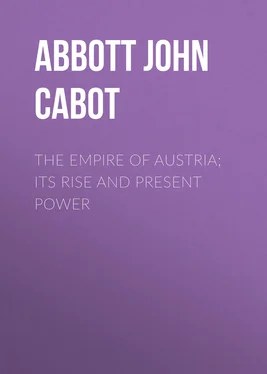John Abbott - The Empire of Austria; Its Rise and Present Power
Здесь есть возможность читать онлайн «John Abbott - The Empire of Austria; Its Rise and Present Power» — ознакомительный отрывок электронной книги совершенно бесплатно, а после прочтения отрывка купить полную версию. В некоторых случаях можно слушать аудио, скачать через торрент в формате fb2 и присутствует краткое содержание. Жанр: Путешествия и география, История, foreign_edu, foreign_antique, foreign_prose, на английском языке. Описание произведения, (предисловие) а так же отзывы посетителей доступны на портале библиотеки ЛибКат.
- Название:The Empire of Austria; Its Rise and Present Power
- Автор:
- Жанр:
- Год:неизвестен
- ISBN:нет данных
- Рейтинг книги:3 / 5. Голосов: 1
-
Избранное:Добавить в избранное
- Отзывы:
-
Ваша оценка:
- 60
- 1
- 2
- 3
- 4
- 5
The Empire of Austria; Its Rise and Present Power: краткое содержание, описание и аннотация
Предлагаем к чтению аннотацию, описание, краткое содержание или предисловие (зависит от того, что написал сам автор книги «The Empire of Austria; Its Rise and Present Power»). Если вы не нашли необходимую информацию о книге — напишите в комментариях, мы постараемся отыскать её.
The Empire of Austria; Its Rise and Present Power — читать онлайн ознакомительный отрывок
Ниже представлен текст книги, разбитый по страницам. Система сохранения места последней прочитанной страницы, позволяет с удобством читать онлайн бесплатно книгу «The Empire of Austria; Its Rise and Present Power», без необходимости каждый раз заново искать на чём Вы остановились. Поставьте закладку, и сможете в любой момент перейти на страницу, на которой закончили чтение.
Интервал:
Закладка:
It was now an object of intense solicitude with Maximilian, to secure the reversion of the crowns of Hungary and Bohemia, which were both upon the brow of Ladislaus, to his own family. With this object in view, and to render assurance doubly sure, he succeeded in negotiating a marriage between two children of Ladislaus, a son and a daughter, and two of his own grand-children. This was a far pleasanter mode of acquiring territory and family aggrandizement than by the sword. In celebration of the betrothals, Ladislaus and his brother Sigismond, King of Poland, visited Vienna, where Ladislaus was so delighted with the magnificent hospitality of his reception, that he even urged upon the emperor, who was then a widower, fifty-eight years of age, that he should marry another of his daughters, though she had but attained her thirteenth year. The emperor declined the honor, jocularly remarking—
"There is no method more pleasant to kill an old man, than to marry him to a young bride."
The German empire was then divided into ten districts, or circles, as they were then called, each of which was responsible for the maintenance of peace among its own members. These districts were, Austria, Burgundy, the Upper Rhine, the Lower Rhine, Franconia, Bavaria, Suabia, Westphalia, Upper Saxony and Lower Saxony. The affairs of each district were to be regulated by a court of a few nobles, called a diet. The emperor devoted especial attention to the improvement of his own estate of Austria, which he subdivided into two districts, and these into still smaller districts. Over all, for the settlement of all important points of dispute, he established a tribunal called the Aulic Council, which subsequently exerted a powerful influence over the affairs of Austria.
One more final effort Maximilian made to rouse Germany to combine to drive the Turks out of Europe. Though the benighted masses looked up with much reverence to the pontiff, the princes and the nobles regarded him only as a power , wielding, in addition to the military arm, the potent energies of superstition. A diet was convened. The pope's legate appeared, and sustained the eloquent appeal of the emperor with the paternal commands of the holy father. But the press was now becoming a power in Europe, diffusing intelligence and giving freedom to thought and expression. The diet, after listening patiently to the arguments of the emperor and the requests of the pontiff, dryly replied—
"We think that Christianity has more to fear from the pope than from the Turks. Much as we may dread the ravages of the infidel, they can hardly drain Christendom more effectually than it is now drained by the exactions of the Church."
It was at Augsburg in July, 1518, that the diet ventured thus boldly to speak. This was one year after Luther had nailed upon the church door in Wittemberg, his ninety-five propositions, which had roused all Germany to scrutinize the abominable corruptions of the papal church. This bold language of the diet, influenced by the still bolder language of the intrepid monk, alarmed Leo X., and on the 7th of August he issued his summons commanding Luther to repair to Rome to answer for heresy. Maximilian, who had been foiled in his own attempt to attain the chair of St. Peter, who had seen so much of the infamous career of Julius and Alexander, as to lose all his reverence for the sacred character of the popes, and who regarded Leo X. merely as a successful rival who had thwarted his own plans, espoused, with cautious development, but with true interest, the cause of the reformer. And now came the great war of the Reformation, agitating Germany in every quarter, and rousing the lethargic intellect of the nations as nothing else could rouse it. Maximilian, with characteristic fickleness, or rather, with characteristic pliancy before every breeze of self-interest, was now on the one side, now on the other, and now, nobody knew where, until his career was terminated by sudden and fatal sickness.
The emperor was at Innspruck, all overwhelmed with his cares and his plans of ambition, when he was seized with a slight fever. Hoping to be benefited by a change of air, he set out to travel by slow stages to one of his castles among the mountains of Upper Austria. The disease, however, rapidly increased, and it was soon evident that death was approaching. The peculiarities of his character were never more strikingly developed than in these last solemn hours. Being told by his physicians that he had not long to live and that he must now prepare for the final judgment, he calmly replied, "I have long ago made that preparation. Had I not done so, it would be too late now."
For four years he had been conscious of declining health, and had always carried with him, wherever he traveled, an oaken coffin, with his shroud and other requisites for his funeral. With very minute directions he settled all his worldly affairs, and gave the most particular instructions respecting his funeral. Changing his linen, he strictly enjoined that his shirt should not be removed after his death, for his fastidious modesty was shocked by the idea of the exposure of his body, even after the soul had taken its flight.
He ordered his hair, after his death, to be cut off, all his teeth to be extracted, pounded to powder and publicly burned in the chapel of his palace. For one day his remains were to be exposed to the public, as a lesson of mortality. They were then to be placed in a sack filled with quicklime. The sack was to be enveloped in folds of silk and satin, and then placed in the oaken coffin which had been so long awaiting his remains. The coffin was then to be deposited under the altar of the chapel of his palace at Neustadt, in such a position that the officiating priest should ever trample over his head and heart. The king expressed the hope that this humiliation of his body would, in some degree, be accepted by the Deity in atonement for the sins of his soul. How universal the instinct that sin needs an atonement!
Having finished these directions the emperor observed that some of his attendants were in tears. "Do you weep," said he, "because you see a mortal die? Such tears become women rather than men." The emperor was now dying. As the ecclesiastics repeated the prayers of the Church, the emperor gave the responses until his voice failed, and then continued to give tokens of recognition and of faith, by making the sign of the cross. At three o'clock in the morning of the 11th of January, 1519, the Emperor Maximilian breathed his last. He was then in the sixtieth year of his age.
Maximilian is justly considered one of the most renowned of the descendants of Rhodolph of Hapsburg. It is saying but little for his moral integrity, to affirm that he was one of the best of the rulers of his age. According to his ideas of religion, he was a religious man. According to his ideas of honesty and of honor, he was both an honest and an honorable man. According to his idea of what is called moral conduct , he was irreproachable, being addicted to no ungenteel vices, or any sins which would be condemned by his associates. His ambition was not to secure for himself ease or luxury, but to extend his imperial power, and to aggrandize his family. For these objects he passed his life, ever tossed upon the billows of toil and trouble. In industry and perseverance, he has rarely been surpassed.
Notwithstanding the innumerable interruptions and cares attendant upon his station, he still found time, one can hardly imagine when, to become a proficient in all the learning of the day. He wrote and spoke four languages readily, Latin, French, German and Italian. Few men have possessed more persuasive powers of eloquence. All the arts and sciences he warmly patronized, and men of letters of every class found in him a protector. But history must truthfully declare that there was no perfidy of which he would not be guilty, and no meanness to which he would not stoop, if he could only extend his hereditary domains and add to his family renown.
Читать дальшеИнтервал:
Закладка:
Похожие книги на «The Empire of Austria; Its Rise and Present Power»
Представляем Вашему вниманию похожие книги на «The Empire of Austria; Its Rise and Present Power» списком для выбора. Мы отобрали схожую по названию и смыслу литературу в надежде предоставить читателям больше вариантов отыскать новые, интересные, ещё непрочитанные произведения.
Обсуждение, отзывы о книге «The Empire of Austria; Its Rise and Present Power» и просто собственные мнения читателей. Оставьте ваши комментарии, напишите, что Вы думаете о произведении, его смысле или главных героях. Укажите что конкретно понравилось, а что нет, и почему Вы так считаете.










